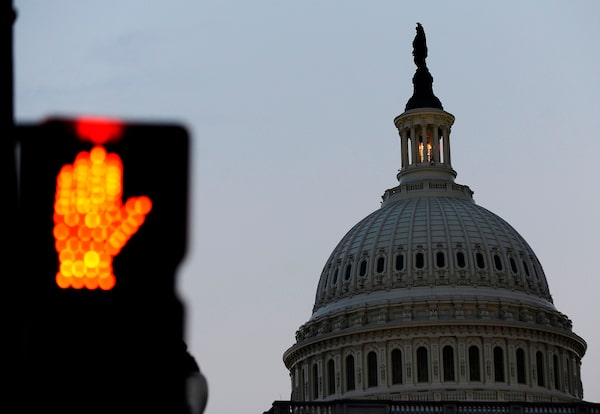
If a potential recession does come this year, maybe politicians and central bankers should simply step aside and let the market do its work.JEWEL SAMAD/AFP/Getty Images
John Rapley is a political economist at the University of Cambridge and the managing director of Seaford Macro.
I recently met someone who called herself a perfectionist, boasting that she’d never failed at anything she tried. While that may be true, I thought it was an odd way to define perfection – being concerned with avoiding failure rather than attaining new heights.
Never failing isn’t actually all that hard. Stick to the beaten path, avoid risks. But as you do that, you’ll also avoid new things. You won’t break new ground or create new ideas.
For Joseph Schumpeter, a scholar of Austrian economics in the early 20th century, it was failure, and in particular business failure, that was essential to economic dynamism. He was the one who’d coined the phenomenon “creative destruction.” Market crashes killed off inefficient businesses and freed resources – their clients, capital and workers – to go toward the more promising firms.
That Austrian view of economics is today in the minority, held mostly by right-wing libertarians. The more dominant schools of thought, like neoclassical theory or the New Keynesianism of economists such as Paul Krugman, eschew the dog-eat-dog undertones which Schumpeter celebrated. It seems we now live in too compassionate a society to celebrate market crashes, business failures and unemployment as evolutionary processes that allow the most adaptable enterprises to thrive.
And there is a price to pay for this current definition of perfection embodied in today’s economics. Our determination to avoid pain has resulted in repeated market interventions across major economies to stem the effect of crashes. That has apparently inhibited dynamism and made economies worse off, more fragile and more in need of such intervention in the future.
If the predicted recession does come this year, maybe politicians and central bankers should simply step aside and let the market do its work.
Take the 2008 crash. The economics profession has spent the last decade patting itself on the back for having devised the economic models that prevented that crisis from turning into another Great Depression (conveniently eliding their having helped devise the models that caused the crash in the first place). Instead, repeated use of loose-money policies kept asset values from plunging, setting a floor under the economy, with the result being a relatively short and shallow recession.
But it’s also meant there’s been little rebound to follow. Since 2008, developed economies have bumped along bottom, never really taking off again. Instead of re-energizing the economy, cheap money has inflated asset prices, taking stock, bond and property markets to record highs. This has kept economies from collapsing into recessions. But it’s also kept “zombie firms” from going out of business, and made it harder for new ones to come into existence. Just as it’s getting ever more difficult to be a first-time home buyer, it’s gotten harder and harder to be a first-time business creator – the cost of rent alone will eat up all your revenues.
Growth has been slow because labour productivity has been near stagnant across the G7. Economists have been at pains to explain why things suddenly went south after 2008, but a recent study by Britain’s Centre for Cities may have solved the puzzle.
Focusing on London, the study found that the rising costs for office space, which have boomed in response to easy-money policies, “have been eating up business budgets and crowding out investment associated with innovation.” Similarly, rising house prices “have reduced London’s ability to compete for global talent.” Sound familiar? Over the last decade, labour productivity has all but stagnated in Canada, but property prices have roared ahead.
I recently encountered the other side of this effect in a conversation in South Africa (where I am living at the moment). A colleague here said he was thinking of migrating to London because he could double his earnings if he went there. I pointed out to him that he’d also take a step down in his lifestyle – which presently included a sprawling home with an Audi in the driveway – because most of his income would disappear to his landlord (or the bank, if he bought a house).
Stocks and bonds began the this year on something of a roll. However, they’ve recently come back under pressure, investors having realized that the battle against inflation is far from won. Property markets look vulnerable. Politicians and central bankers will no doubt be monitoring the situation carefully for strains, and will come under pressure to do something if prices start dropping sharply.
But if they just buckle up and get ready for the ride, the ultimate destination might be a better one for the economy, and for most of those trying to make their way forward in it.